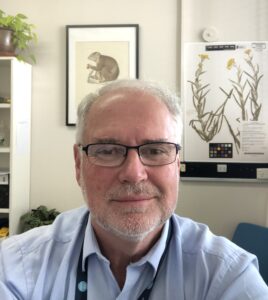 This is the first in the series of short statements from candidates in the coming CODATA Elections at the General Assembly to be held on 27-28 October 2023. Andrew Young is a candidate for the CODATA Executive Committee as an Ordinary Member. He was nominated by Australia.
This is the first in the series of short statements from candidates in the coming CODATA Elections at the General Assembly to be held on 27-28 October 2023. Andrew Young is a candidate for the CODATA Executive Committee as an Ordinary Member. He was nominated by Australia.
I am a plant ecological geneticist working in the field of biodiversity science at the Commonwealth Scientific and Industrial Research Organisation (CSIRO) in Australia. My primary role for the last eight years has been as Director of Australia’s National Research Collections (NRCA): https://www.csiro.au/en/Showcase/NRCA. I am currently a member of Australia’s National Committee for Data in Science (Australian National CODATA committee) and Vice-Chair of the Global Biodiversity Information Facility Executive: https://www.gbif.org/.
My main interest in development of data strategy is in the management of biodiversity datasets to improve ecological management and long-term environmental outcomes and the use of new tools and technologies for collecting and analysing biodiversity data at scale. I am particularly interested the integration and mobilisation of new types of data from the world’s 2+ billion museum specimens (e.g. genomes, images, sounds, cultural information) and evolving frontiers in data analytics including genomics, high-throughput digitisation, machine learning and artificial intelligence as applied biological collections.
As NRCA Director I have supported the development of a high-throughput specimen digitisation program as well as the complete refresh of collections data infrastructure. These changes have significantly improved the digital maturity of Australia’s national collections to support the discoverability, global integration, and use of specimen data under FAIR principles (CODATA Priority 3: Data Stewardship). The work has also seen significant progress made in advancing our capability in machine learning and AI-based analytics of specimens, in particular with regard to digital trait extraction and species identification. This is proving valuable with regard to improving the technical capacity of Australia’s biosecurity sector (CODATA Priority 1: Making Data Work). All of these activities and programs have strong underpinning elements in terms of training technical staff, graduate students and post-doctoral fellows (CODATA Priority 4: Data Skills and Education). I am committed to the development of the next generation of Australian scientists and for the last six years have chaired several of the national Fulbright Foundation Scholarship panels: https://www.fulbright.org.au/.
While undertaking these roles and activities I have continued to conduct my own research publishing 100+ peer-reviewed papers. I have also initiated two major data-intensive national collaborative research programs. The Biomes of Australian Soil Environments project (now part of Ausmicrobiome: https://www.australianmicrobiome.com/) has used metagenomic analysis of over 2000 sites across Australia to measure and map the continent’s soil microbiome using over 10 billion environmental DNA sequences. The Environomics Future Science Platform (https://research.csiro.au/environomics/) has led the development in Australia of the application of scalable eDNA based approaches to environmental monitoring including the ongoing development of a National Biodiversity DNA Library.
I am passionate about the opportunities presented by emerging technologies to massively increase the richness of the global biodiversity data ecosystem and committed to taking advantage of the rapidly evolving ability to integrate and interrogate these different data streams to provide the information needed to manage the planet’s critical biological systems into the future in the face of global environmental change.
